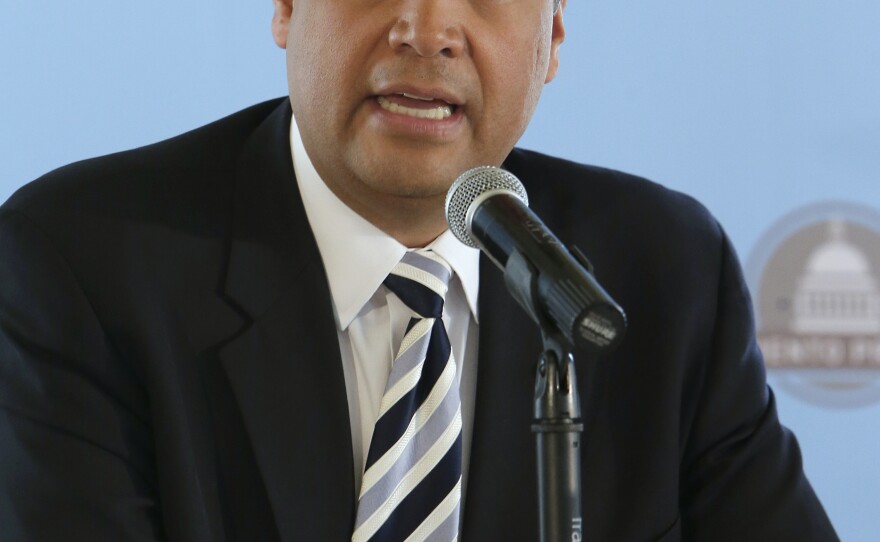>> What is fake news? Is it a false news story liberally concocted to sway public opinion? Or is a factual information people in power don't like? It could be either depending on who you ask. But be on the catchphrase of fake news, there is actually a way to determine if what you're hearing, reading or seeing is reliable information. You can get some tools to make that determination at a series of workshops getting this week at the San Diego public library. The program on news literacy is called breaking news at the library. Joining me is one McBeth, programming and special events coordinator with the San Diego public library. And, Roger Shirley is here. Now, or one, why is library checking on this? >> I think it is in the DNA of libraries to write our communities with the best information sources. As a heart and soul of library services. We connect people with accurate information and give them the tools to determine the truth. >> This first workshop on Wednesday is called citizen journalism. Will people be learning about? >> People will be learning about what goes on behind the news and how it works. How does a story become news and it is what people should get from it. They would learn what the facts are and how determined that. >> Roger, what is your role in the workshop? >> I guess I suggested this to a few months ago when we had a similar discussion at the central library in November. I said we should get the public to learn how to recognize what news is and help reported when something happens in the neighborhood and you should aged -- and who they should call. I think that is the role and what will happen on Wednesday. Our editorial director, Matt Hall will lead an hour-long session. It is at 6:30 PM at the central library. Everyone is invited. He will go through the basics of journalism. You think people would know this from third grade, you think they would know the freedom of press is, what is a newspaper or TV station, but it seems like that people have forgotten what news is. What is our job in society, why we have a free press, why is it important to democracy in America? This is kind of a remedial session for the public to remind them why it is important, what is the role of the news media and some of the questions. And then it will be Matt's recitation the second half. That he will take questions from the audience. They will ask things like how do you decide what goes into the newspaper or on TV? Who makes these decisions? What is new, how do we recognize what is news raising >> Newsworthy? >> What you think the public is wrong about your job? >> I guess they don't understand how we decide what to write or do day-to-day. Another told me many years ago that the news is something that is new. It is not something that came up this morning and is set this evening. It is what is different or unusual, what is happening, our job is to tell what is going on around people. But there's all kinds of news besides street news or event driven news. There's also interpretive news, there's investigative, there is editorials, help columns, we all have a wide variety of roles to play in giving information to people. That's for the library and his media intersect. News is the first draft of history. Of course we make mistakes because people who tell us things don't necessarily know they're talking about. It is costly changing in the public has to realize that the news is not all there is to it. There are other sources of information besides what you get in the media. But, we feel like if we remind people what our role is and how we operate, they will have a better appreciation. >> What are the other workshops in these series? >> Will have a workshop on literacy on Fairbury 20th and will have minority in the media discussion on a very 28th and will have women in the media on March 20th. >> The breaking news at the library series starts this Wednesday evening with a clash -- class on citizen journalism. That's at the downtown library in San Diego. Thank you both for being here.
Since the 2016 election, U.S. election officials have been focused on ensuring the integrity of the nation's election system due to cyber security concerns. But California Secretary of State Alex Padilla said the biggest threat to the state’s election system is actually old voting equipment.

“Not only is it based on outdated technology, the bottom line is the machines are old,” Padilla said. “When they have to find replacement parts that are no longer made and they have to hunt for them on Ebay, that’s not a good thing… We’re kind of living on borrowed time.”
In his state budget proposal, California Governor Jerry Brown included $134 million for new voting systems for all 58 counties. The funding requires a local match by the counties.
RELATED: Secretary Of State Alex Padilla To Discuss Voting Rights With UC San Diego Students
San Diego County’s optical scan technology-based voting equipment is 14 years old, according to county registrar Michael Vu.
Padilla said the need to upgrade and replace the state's voting equipment predates the 2016 election cycle, but reports about Russian activity ahead of the 2016 November election, raised the priority level to get new voting equipment.
Padilla discusses Tuesday on Midday Edition, what is being done to make sure California’s voting system is secure for the 2018 midterm elections.






